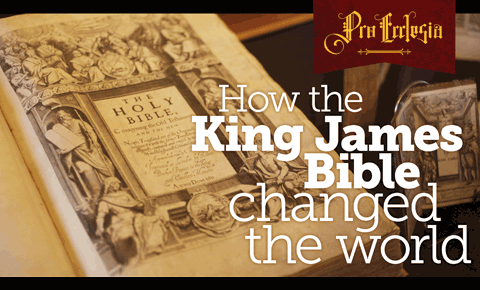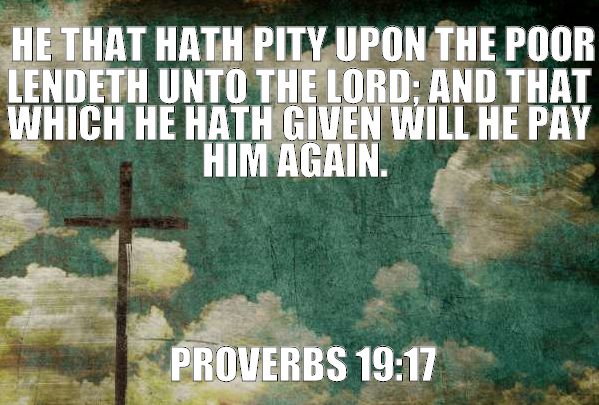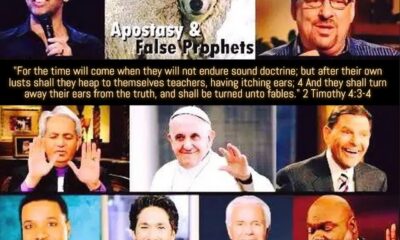by David W. Daniels
Question: Who were the translators of the King James Bible?
Answer: God brought together over 54 of the finest Bible translators English has ever known, to translate the King James Bible.
 Researching the Translators
Researching the Translators
For twenty years (the late 1830s to the late 1850s) researcher Alexander McClure pored over records to learn all he could about who translated the King James Bible. His resulting book, Translators Revived: Biographical Notes on the King James Version Translators, stands as a monument to these dedicated Christian men. It may be read online at www.books.google.com. I highly recommend it.
A Few Short Examples
Here are some of the qualified translators of the King James Bible.
John Harman, M.A., New College, Oxford.
In 1585 he had been appointed King’s Professor of Greek. He had published Latin translations of Calvin’s and Beza’s sermons, and was also adept in Greek. He was a member of the New Testament group that met at Oxford.
John Spencer
At 19 years of age he had been elected Greek lecturer for Corpus Christi College in Oxford University. It was written of him, “Of his eminent scholarship there can be no question.” He was a member of the New Testament group (Romans through Jude) that met at Westminster.
Thomas Bilson
McClure wrote that he was “so complete in divinity, so well skilled in languages, so read in the Fathers and Schoolmen, so judicious in making use of his readings, that at length he was found to be no longer a soldier, but commander in chief in the spiritual warfare” (Translators Revived, pp. 214-416).
Dr. George Abbot, B.D., D.D.
Dr. Abbot started at Oxford in 1578, getting his B.D. in 1593 and at 35 years of age both received his doctorate and became first Master of University College, and later Vice Chancellor. He became Bishop of Lichfield in 1609 and Archbishop of Canterbury in 1611. He was regarded as “the head of the Puritans within the Church of England.” He was in the Oxford New Testament group.
Sir Henry Saville
In 1565 Sir Saville was Fellow of Merton College and Warden in 1585. By 1596 he was Provost of Eton College and tutor to Queen Elizabeth I. He founded the Savillian professorships of Mathematics and Astronomy at Oxford. His many works include an 8-volume set of the writings of Chrysostom.(1) He also worked in the New Testament group at Oxford.
Lancelot Andrewes
From Terence H. Brown, (Secretary of the Trinitarian Bible Society, London, England) comes this description of Westminster committee member Lancelot Andrewes:
He “… had his early education at Coopers Free School and Merchant Taylors School, where his rapid progress in the study of the ancient languages was brought to the notice of Dr. Watts, the founder of some scholarships at Pembroke Hall, Cambridge. Andrewes was sent to that College, where he took his B.A. degree and soon afterward was elected Fellow. He then took his Master’s degree and began to study divinity and achieved great distinction as a lecturer. He was raised to several positions of influence in the Church of England and distinguished himself as a diligent and excellent preacher, and became Chaplain to Queen Elizabeth I. King James I promoted him to be Bishop of Chester in 1605 and also gave him the influential position of Lord Almoner. He later became Bishop of Ely and Privy Counsellor. Toward the end of his life he was made Bishop of Winchester.
“It is recorded that Andrewes was a man of deep piety and that King James had such great respect for him that in his presence he refrained from the levity in which he indulged at other times. A sermon preached at Andrewes’ funeral in 1626 paid tribute to his great scholarship:
‘His knowledge in Latin, Greek, Hebrew, Chaldee, Syriac and Arabic, besides fifteen modern languages was so advanced that he may be ranked as one of the rarest linguists in Christendom. A great part of five hours every day he spent in prayer, and in his last illness he spent all his time in prayer — and when both voice and eyes and hands failed in their office, his countenance showed that he still prayed and praised God in his heart, until it pleased God to receive his blessed soul to Himself.'”
Transcending Their Human Limits
Gustavus S. Paine, author of The Men Behind the King James Version, made this assessment about the work of the combined translators:
“Though we may challenge the idea of word-by-word inspiration, we surely must conclude that these were men able, in their profound moods, to transcend their human limits. In their own words, they spake as no other men spake because they were filled with the Holy Ghost. Or, in the clumsier language of our time, they so adjusted themselves to each other and to the work as to achieve a unique coordination and balance, functioning thereafter as an organic entity–no mere mechanism equal to the sum of its parts, but a whole greater than all of them.” (2)
While these scholars were perfectly suited for the task of translation individually, they still had to agree on every single word of the Bible. That meant man’s mere opinion could not be allowed to stand in the text.
The One Who Started It All
But these translators were standing on the shoulders of great men and Christians who went before them. And one man did more for the English Bible than any single person before or since: William Tyndale. He was ordained a priest around his late teens, in 1502. By 1515 he had earned his M.A. at Oxford and later transferred to Cambridge. It was there that he came upon the preserved Greek New Testament of Erasmus, and at the same time as Martin Luther, he came to understand the truth of the gospel. Tyndale began preaching and teaching the gospel message, which made the Roman Catholics angry with him, branding him a heretic. One day, while proving a “learned” Roman Catholic scholar wrong, the papist cried out, “It were better for us to be without God’s laws, than without the Pope’s!” To which Tyndale prophetically replied,
“I defy the Pope, and all his laws; and if God spare my life, ere many years, I will cause a boy that driveth the plough to know more of the Scripture than you do!”
This changed Tyndale forever. He wrote about this incident,
“Which thing only moved me to translate the New Testament. Because I had perceived by experience, how that it was impossible to establish the lay people in any truth, except the Scriptures were plainly laid before their eyes in the mother tongue” (Translators Revived, p. 23).
Tyndale was well suited to his task. Spalatin, a friend of Martin Luther, wrote this in his diary of what professor Herman Buschius told him about Tyndale and his New Testament:
“The work was translated by an Englishman staying there with two others,–a man so skilled in the seven languages, Hebrew, Greek, Latin, Italian, Spanish, English, and French, that which-ever he spake, you would suppose it his native tongue” (Translators Revived, pp. 27-28)
By the time Tyndale was betrayed by his friend, imprisoned and nearly frozen during a cold winter in his cell, he had translated the New Testament into English, along with some Old Testament books, and had trained at least two others to carry on his work. But he wasn’t finished, even when burnt at the stake on October 6, 1536, he cried out prophetically:
“Lord! Open the King of England’s eyes” (Dr. William Grady, Final Authority, p. 137)
That very day a copy of Tyndale’s New Testament was being printed by the King’s own printer!
Conclusion
Tyndale’s work of translation was so excellent, that easily 70% of the words of the Bible are Tyndale’s. God had set the standard. Over the next century, God’s preserved words were translated and revised by many scholars, a great many “good translations.” These, along with God’s preserved words in Italian, Spanish, French, Dutch and other languages were all “good translations.” But the goal of the king’s translators of 1604-1611 was not to write a new Bible from scratch, nor was it to make a translation from the Roman Catholic perversions:
“Truly, good Christian Reader, we never thought from the beginning that we should need to make a new translation, nor yet to make of a bad one a good one; … but to make a good one better, or out of many good ones one principal good one, not justly to be excepted against; that hath been our endeavor, that our mark” (The Translators to the Reader, 1611 KJV, ninth page).
And that is exactly what God did. Throughout history God preserved His words. And, culminating with over 54 dedicated, learned Christian men, God put His words in English in its perfection in one final translation: The King James Bible.
May God bless you as you read His preserved words in English, the King James Bible.
Footnotes
Articles
Despicable Dogs and Stabbing Swine [podcast]

Matthew 7:6
“Give not that which is holy unto the dogs, neither cast ye your pearls before swine, lest they trample them under their feet, and turn again and rend you.”
God’s wisdom is that you have to get rid of the “SCORNER” in order to get rid of the “STRIFE”.
“Cast out the SCORNER, and contention shall go out; yea, STRIFE and reproach shall cease.” Proverbs 22:10
How do we know when someone has truly repented?
“… to the Gentiles, that they should repent and turn to God, and do works meet for repentance.” Acts 26:20
When someone has truly repented, their changed life will be full of the fruit of the Spirit.
“Bring forth fruits meet for repentance” simply means prove you’ve repented with the corresponding restitution of making things right (Matthew 3:7-10; Luke 19:8-9, etc.).
Luke 17
1 Then said he unto the disciples, It is impossible but that offences will come: but woe unto him, through whom they come!
2 It were better for him that a millstone were hanged about his neck, and he cast into the sea, than that he should offend one of these little ones.
3 Take heed to yourselves: If thy brother trespass against thee, rebuke him; and if he repent, forgive him.
4 And if he trespass against thee seven times in a day, and seven times in a day turn again to thee, saying, I repent; thou shalt forgive him.
“And that we may be delivered from unreasonable and wicked men: for all men have not faith.” 2 Thessalonians 3:2
“Behold, I send you forth as sheep in the midst of wolves: be ye therefore wise as serpents, and harmless as doves.” Matthew 10:16
Jesus saw the heart and proof of Zacchaeus’ repentance and granted him salvation.
“And Zacchaeus stood, and said unto the Lord; Behold, Lord, the half of my goods I give to the poor; and if I have taken any thing from any man by false accusation, I restore him fourfold. 9 And Jesus said unto him, This day is salvation come to this house, forsomuch as he also is a son of Abraham. 10 For the Son of man is come to seek and to save that which was lost.” Luke 19:8-10
Support | STORE | Podcasts | Jail/Prison Ministry | Mexico Mission here | All Ministry Updates | The Return of Christ | Stewardship | Where to Give and Where Not to Give | Fruit Abounding to Your Account! | Victory in Jesus | Discipleship | The Glorious Grace of God | The Restoring Love of Our God | God’s Mercy | Spiritual Warfare | Justification | Grace and Good Works [podcast] | Haggai



Articles
Rich in Faith [podcast]
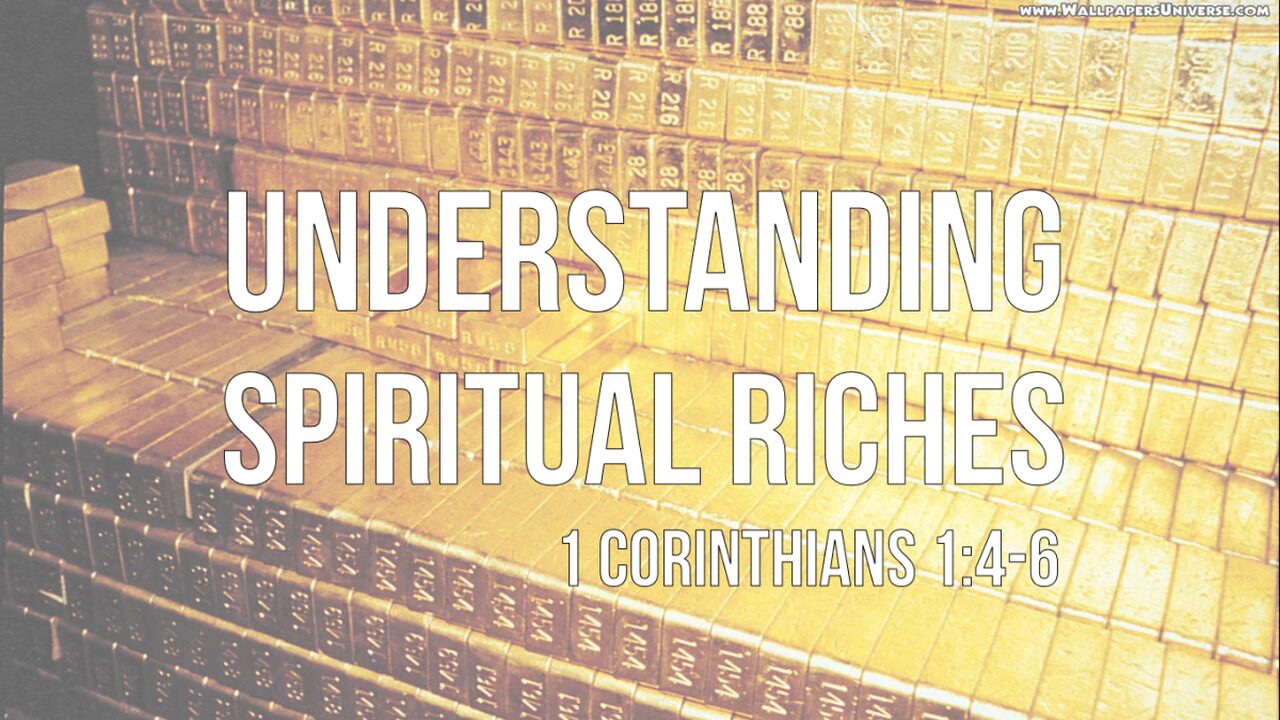
“Them that Love Him”
——WHAT one temporarily has in this fleeting world or doesn’t have, has NOTHING to do with that person’s spiritual state. This is what Jesus taught: “Take heed, and beware of covetousness: for a man’s life consisteth not in the abundance of the things which he possesseth.” (Luke 12:15) In fact James says:
“HEARKEN, MY BELOVED BRETHREN, HATH NOT GOD CHOSEN THE POOR OF THIS WORLD RICH IN FAITH, AND HEIRS OF THE KINGDOM WHICH HE HATH PROMISED TO THEM THAT LOVE HIM?” JAMES 2:5
James says God chooses those for His eternal kingdom “that love him,” namely “the poor of this world.” We are justified by “faith” and not by what we do or do not temporarily possess in this fleeting life.
IF in your mind you rate people by what they have or don’t have in this fleeting sinful world, you are deeply deceived and in utter need of repentance and the washing of water by the Word of God. You are carnally minded (Romans 8:5-6).
Regrettably, it seems that most people professing to be following Christ, the One who gave all, are not the least bit concerned if their brother or sister has a need. God have mercy upon us and grant us repentance in Jesus’ Name! Are these people truly saved?
“Hereby perceive we the love of God, because he laid down his life for us: and we ought to lay down our lives for the brethren. 17 But whoso hath this world’s good, and seeth his brother have need, and shutteth up his bowels of compassion from him, how dwelleth the love of God in him? 18 My little children, let us not love in word, neither in tongue; but in deed and in truth. 19 And hereby we know that we are of the truth, and shall assure our hearts before him.” 1 John 3:16-19
“If we are in Jesus we have the unsearchable riches of Christ (Ephesians 3:8). Unfathomable (in our small minds), infinite wealth and spiritual blessings! Endless mercy, grace, and forgiveness. That is inexhaustible! Why do we need any worldly riches that will rot and corrupt our hearts!? Lay up in your hearts God’s riches! Which are eternal!” Karen Cochran
Some have tens of thousands in the bank and could care less to find out if a sister or brother has a need. The Bible assures us that they are not saved. If you have even a little to give and don’t, it’s because you simply have chosen not to know and abide in Christ.
“What doth it profit, my brethren, though a man say he hath faith, and have not works? can faith save him? 15 If a brother or sister be naked, and destitute of daily food, 16 And one of you say unto them, Depart in peace, be ye warmed and filled; notwithstanding ye give them not those things which are needful to the body; what doth it profit? 17 Even so faith, if it hath not works, is dead, being alone.” James 2:14-17
The financial institutions and their salesmen are vying for your money. They want your money to invest so that you and they earn a financial gain in this life. Christians in need, orphans, and Gospel workers are also available to invest in. To help them is to invest in the LORD’s kingdom and be repaid dividends for eternity. Oh, and your heart will follow where you choose to place your money. Jesus says “Lay not up for yourselves treasures upon earth, where moth and rust doth corrupt, and where thieves break through and steal: 20 But lay up for yourselves treasures in heaven, where neither moth nor rust doth corrupt, and where thieves do not break through nor steal: 21 For where your treasure is, there will your heart be also.” (Matthew 6:19-21)
PRAYER: Holy Father, please break me and make me Your authentic follower. Jesus I love You. Let me walk as You walked, live as You lived, love as You love. Bless this life You gave to be truly crucified with You – dead, buried, and raised up – a vessel of honor for Your glory! In Jesus’ name.
Let’s Grow Together! Sign up here to begin receiving the Moments with Our Master email devotional that is sure to help you grow in His grace and in the knowledge of our LORD and Savior Jesus Christ (2 Pet. 1:2; 3:18). It’s sent out for the edification of the body of Christ. Sign Up HERE.
Support | STORE | Podcasts | Jail/Prison Ministry | Mexico Mission here | All Ministry Updates | More on Assurance here | Because You Care Page | The Greatest of these is Charity | Be Ready in the Morning [podcast] | The Sure Mercies of David [podcast] | That Repentance and Remission of Sins should be Preached [podcast] | At His Feet | Knowing God | The Cross Life | 100’s of Christ-centered Scripture-rich Podcasts | Christology = the Study of Christ


Abiding
Safety in Wise Counsel [podcast]
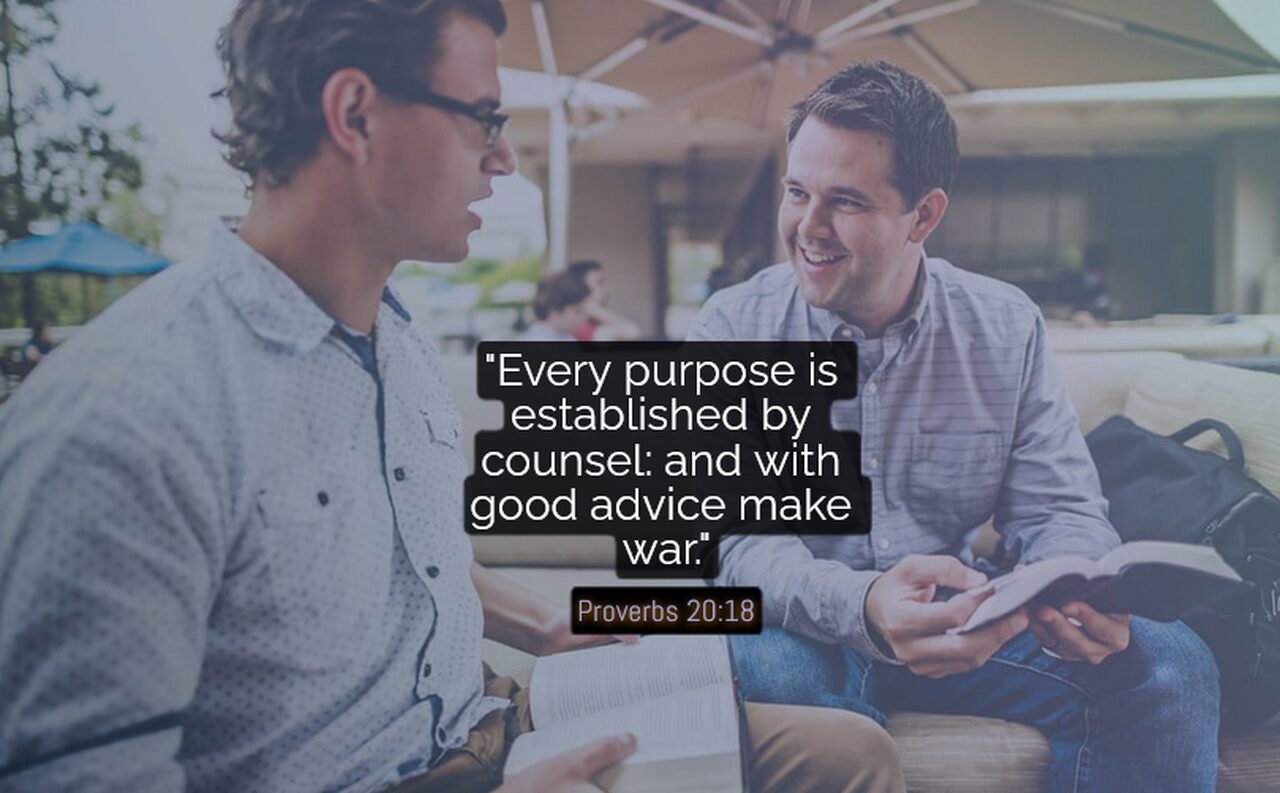
“Every purpose is established by counsel: and with good advice make war.” Proverbs 20:18
“The steps of a good man are ordered by the Lord: and he delighteth in his way.” Psalms 37:23
“So teach us to number our days, that we may apply our hearts unto wisdom.” Psalms 90:12
“Safety” in wise counsel from God’s wisdom, Word, and including at times with the help of His beloved saints.
“Where no counsel is, the people fall: but in the multitude of counsellors there is safety.” Proverbs 11:14
“The horse is prepared against the day of battle: but safety is of the LORD.” Proverbs 21:31
“For by wise counsel thou shalt make thy war: and in multitude of counsellors there is safety.” Proverbs 24:6
Caprice means a sudden and unaccountable change of mood or behavior.
“Who is a wise man and endued with knowledge among you? let him shew out of a good conversation his works with meekness of wisdom. 14 But if ye have bitter envying and strife in your hearts, glory not, and lie not against the truth. 15 This wisdom descendeth not from above, but is earthly, sensual, devilish. 16 For where envying and strife is, there is confusion and every evil work. 17 But the wisdom that is from above is first pure, then peaceable, gentle, and easy to be intreated, full of mercy and good fruits, without partiality, and without hypocrisy. 18 And the fruit of righteousness is sown in peace of them that make peace.” James 3:13-18
Support | STORE | Podcasts | Jail/Prison Ministry | Mexico Mission here | All Ministry Updates | 100’s of Christ-centered Podcasts | Bible Books Narrated | Bible Study Helps | The Book of James Narrated [podcast] | The Book of Revelation Narrated [podcast] | Colossians Overview [podcast]



 America12 months ago
America12 months agoThe Drugging of America: The Pharmakeia Sorcery Deception [podcast]

 Articles2 years ago
Articles2 years agoChildren being Rescued in Tunnels: Happening Now – UPDATE!

 Articles8 years ago
Articles8 years agoSelf-Examination in Preparation for the Lord’s Return

 Apostasy2 years ago
Apostasy2 years agoSHOCKING List of False Prophets Most Believe are True


